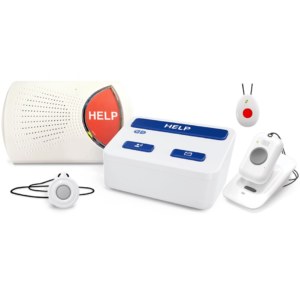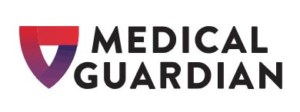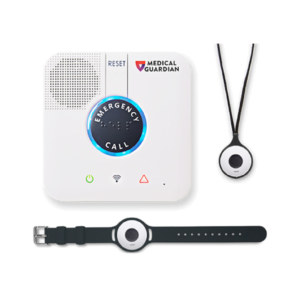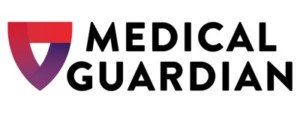Medical Alert Vs. Medical Guardian: Which Is Right For You?
AgingInPlace.org keeps our resources free by working as an affiliate partner with some companies mentioned on our site. These partnerships or the commission we may earn do not affect our opinions or evaluations of the products we mention. Our reviews are solely based on our research methodology and from input from our AgingInPlace.org Advisory Board. Learn more about our ad policies.
Medical Alert Vs. Medical Guardian: Which Is...
Products carousel
Key Takeaways
- Both companies are rated A+ by the BBB, and Medical Guardian is also BBB-accredited
- Each system (other than the Freedom Guardian watch) can be equipped with optional fall detection for $10 per month
- Medical Alert offers a 30-day risk free trial, and the ability to cancel anytime. Medical Guardian offers month-to-month subscriptions after a three-month minimum
- Medical Guardian’s home systems have a range of 1,300-1,400 feet, while Medical Alert offers an 800-foot range
- Both Medical Alert and Medical Guardian systems link up with apps to offer caregivers support and updates

For many older adults hoping to age in place, a medical alert system is an essential part of their care plan. It helps give users peace of mind and reassures their loved ones that they have a safety net should they need emergency help. But choosing the right medical alert device for you or a loved one can be daunting—there are so many companies to choose from. When comparing the best medical alert systems, Medical Alert and Medical Guardian consistently top the list. In this review, we detail technology, customer service, and costs in a side-by-side comparison for these two popular emergency alert systems to help you decide the best system for your needs.
Why You Can Trust Our Expert Review
Our experts independently research and recommend products we believe provide value in the lives of our readers. We’ve spent collectively more than 1,700 hours conducting in-depth research on medical alert systems. To make our picks, here’s what we did:
- Engaged in ongoing independent research
- Consulted with geriatricians and adult caregivers
- Mystery shopped the brands
- Surveyed medical alert system users
- Tested various medical alert systems
- Interviewed experts in the field
- Read hundreds of verified customer reviews from trusted third parties such as Better Business Bureau and
Consumer Reports
Comparing Medical Alert vs. Medical Guardian: Costs and Fees
| Cost | Upfront fee | Activation fee | Contract | Add-on features | |
|---|---|---|---|---|---|
| Medical Alert Model | |||||
| Home System With Landline Coverage | $22.95 per month | No | No | Month-to-month | Fall detection: extra $10 monthly |
| Home System With Cellular Coverage | $32.95 per month | No | No | Month-to-month | Fall detection: extra $10 monthly |
| Mobile System | $42.95 per month | No | No | Month-to-month | Fall detection: extra $10 monthly |
| Medical Guardian | |||||
| Classic Guardian | $29.95 per month | No | No | Month-to-month (after 3-month minimum) | Fall detection: extra $10 monthly |
| Home 2.0 | $34.95 per month | No | No | Month-to-month (after 3-month minimum) | Fall detection: extra $10 monthly. Wall-mounted buttons available at $2.99 and $4.99. |
| Mobile 2.0 | $49.95 per month | No | No | Month-to-month (after 3-month minimum) | Fall detection: extra $10 monthly |
| Active Guardian | $44.95 per month | No | No | Month-to-month (after 3-month minimum) | Fall detection: extra $10 monthly |
| Fall detection: | $39.95 per month | One-time fee of $124.95 | No | Month-to-month (after 3-month minimum) | Fall detection: extra $10 monthly |
| Freedom Guardian | $44.95 per month; one-time fee of $179.95 | One-time fee of $179.95 | No | Month-to-month (after 3-month minimum) | No fall detection available. |
| Medical Alert Model | Cost | Upfront fee | Activation fee | Contract | Add-on features |
|---|
| Home System With Landline Coverage | Cost | $22.95 per month | Upfront fee | No | Activation fee | No | Contract | Month-to-month | Add-on features | Fall detection: extra $10 monthly |
|---|
| Home System With Cellular Coverage | Cost | $32.95 per month | Upfront fee | No | Activation fee | No | Contract | Month-to-month | Add-on features | Fall detection: extra $10 monthly |
|---|
| Mobile System | Cost | $42.95 per month | Upfront fee | No | Activation fee | No | Contract | Month-to-month | Add-on features | Fall detection: extra $10 monthly |
|---|
| Medical Guardian | Cost | Upfront fee | Activation fee | Contract | Add-on features |
|---|
| Classic Guardian | Cost | $29.95 per month | Upfront fee | No | Activation fee | No | Contract | Month-to-month (after 3-month minimum) | Add-on features | Fall detection: extra $10 monthly |
|---|
| Home 2.0 | Cost | $34.95 per month | Upfront fee | No | Activation fee | No | Contract | Month-to-month (after 3-month minimum) | Add-on features | Fall detection: extra $10 monthly. Wall-mounted buttons available at $2.99 and $4.99. |
|---|
| Mobile 2.0 | Cost | $49.95 per month | Upfront fee | No | Activation fee | No | Contract | Month-to-month (after 3-month minimum) | Add-on features | Fall detection: extra $10 monthly |
|---|
| Active Guardian | Cost | $44.95 per month | Upfront fee | No | Activation fee | No | Contract | Month-to-month (after 3-month minimum) | Add-on features | Fall detection: extra $10 monthly |
|---|
| Fall detection: | Cost | $39.95 per month | Upfront fee | One-time fee of $124.95 | Activation fee | No | Contract | Month-to-month (after 3-month minimum) | Add-on features | Fall detection: extra $10 monthly |
|---|
| Freedom Guardian | Cost | $44.95 per month; one-time fee of $179.95 | Upfront fee | One-time fee of $179.95 | Activation fee | No | Contract | Month-to-month (after 3-month minimum) | Add-on features | No fall detection available. |
|---|
Comparing Medical Alert vs. Medical Guardian: Features
| Connection type | Wwall-mounted buttons? | Two-way communication? | Battery life | Water- resistant? | |
|---|---|---|---|---|---|
| Medical Alert Model | |||||
| Home System With Landline Coverage | Landline | No | Yes | 30-hour backup battery | Yes |
| Home System With Cellular Coverage | AT&T cellular | No | Yes | 32-hour backup battery | Yes |
| Mobile System | AT&T cellular, GPS | N/A (mobile model) | Yes | 5 days | Yes |
| Medical Guardian | |||||
| Classic Guardian | Landline | No | Yes | 32-hour backup battery | Yes |
| Home 2.0 | WiFi, 4G | Yes | Yes | 32-hour backup battery | Yes |
| Mobile 2.0 | WiFi, GPS, 4G LTE | N/A (mobile model) | Yes | 5 days | Yes |
| Active Guardian | WiFi, GPS, 4G LTE | N/A (mobile model) | Yes | 7 days | Yes |
| Mini Guardian | WiFi, GPS, 4G LTE | N/A (mobile model) | Yes | 5 days | Yes |
| Freedom Guardian | WiFi, GPS, 4G LTE | N/A (mobile model) | Yes | 48 hours | Yes |
| Medical Alert Model | Connection type | Wwall-mounted buttons? | Two-way communication? | Battery life | Water- resistant? |
|---|
| Home System With Landline Coverage | Connection type | Landline | Wwall-mounted buttons? | No | Two-way communication? | Yes | Battery life | 30-hour backup battery | Water- resistant? | Yes |
|---|
| Home System With Cellular Coverage | Connection type | AT&T cellular | Wwall-mounted buttons? | No | Two-way communication? | Yes | Battery life | 32-hour backup battery | Water- resistant? | Yes |
|---|
| Mobile System | Connection type | AT&T cellular, GPS | Wwall-mounted buttons? | N/A (mobile model) | Two-way communication? | Yes | Battery life | 5 days | Water- resistant? | Yes |
|---|
| Medical Guardian | Connection type | Wwall-mounted buttons? | Two-way communication? | Battery life | Water- resistant? |
|---|
| Classic Guardian | Connection type | Landline | Wwall-mounted buttons? | No | Two-way communication? | Yes | Battery life | 32-hour backup battery | Water- resistant? | Yes |
|---|
| Home 2.0 | Connection type | WiFi, 4G | Wwall-mounted buttons? | Yes | Two-way communication? | Yes | Battery life | 32-hour backup battery | Water- resistant? | Yes |
|---|
| Mobile 2.0 | Connection type | WiFi, GPS, 4G LTE | Wwall-mounted buttons? | N/A (mobile model) | Two-way communication? | Yes | Battery life | 5 days | Water- resistant? | Yes |
|---|
| Active Guardian | Connection type | WiFi, GPS, 4G LTE | Wwall-mounted buttons? | N/A (mobile model) | Two-way communication? | Yes | Battery life | 7 days | Water- resistant? | Yes |
|---|
| Mini Guardian | Connection type | WiFi, GPS, 4G LTE | Wwall-mounted buttons? | N/A (mobile model) | Two-way communication? | Yes | Battery life | 5 days | Water- resistant? | Yes |
|---|
| Freedom Guardian | Connection type | WiFi, GPS, 4G LTE | Wwall-mounted buttons? | N/A (mobile model) | Two-way communication? | Yes | Battery life | 48 hours | Water- resistant? | Yes |
|---|
Comparing Medical Alert vs. Medical Guardian: Fall Detection
| Fall detection? | GPS locator? | Call center and hours | |
|---|---|---|---|
| Medical Alert Model | Yes, optional in both systems. | Yes | 24/7, TMA-Five Diamond Certified response center |
| Medical Guardian | Yes, optional in all systems except Freedom Guardian 2.0 watch. | Yes | 24/7, TMA-Five Diamond Certified response center |
| Medical Alert Model | Fall detection? | Yes, optional in both systems. | GPS locator? | Yes | Call center and hours | 24/7, TMA-Five Diamond Certified response center |
|---|
| Medical Guardian | Fall detection? | Yes, optional in all systems except Freedom Guardian 2.0 watch. | GPS locator? | Yes | Call center and hours | 24/7, TMA-Five Diamond Certified response center |
|---|
Medical Alert is a branch of Connect America, a Philadelphia-based company. It’s one of the most well-known names in the medical alert market that maintains a low price point. Medical Alert offers a line of simple, no-frills emergency devices. While its models don’t include a lot of options for customization, they do have the essentials: wearable push buttons, optional fall detection, and an app for caregivers.
Who Is Medical Alert Ideal for?

Since one in four seniors experiences a fall each year, according to the CDC, Medical Alert aims to protect aging adults who want to maintain their freedom. Optional fall detection makes it a good choice for those with medical risks that put them at high risk of falling—especially those living alone. Because of Medical Alert’s robust caregiving app, Medical Alert Connect, this brand is a good match for caregivers looking to stay looped in to their loved one’s care, even while away or living long-distance.
What Are the Costs of Medical Alert?

Medical Alert is one of the more affordable medical alert brands on the market. It offers two basic models: the Home System and the Mobile System. Customers can add automatic fall detection to either package for an additional $10 per month.
The landline version of the Home System is the entry-level package; subscribers pay $22.95 per month. Those who bundle their monthly payments into one annual amount receive a discount, which comes out to $19.95 per month. The Home System with cellular service is $32.95 per month, but it’s $29.95 when users pay the full year up front.
Mobile System users pay $42.95 per month. Users who bundle their monthly payments into one annual payment earn a $75 discount per year, bringing the price to $39.95 monthly. The Annual Plan also comes with free shipping, one free month, and a complimentary lockbox.
Pros and Cons of Medical Alert
Pros
-
Affordable, quality medical alert systems between $22.95 and $42.95 per month (before bundle discounts)
-
No equipment or activation fees
-
Help button connects to a TMA-Five Diamond Certified monitoring center
-
Bundle package customers also receive free shipping, one free month of service, and a lockbox to allow first responders easy entry into the home
-
Option to add automatic fall detection to both systems
-
App can be accessed by both users and caregivers for customer support, GPS tracking, and checking batteries
Cons
-
Automatic fall detection costs an extra $10 per month
-
The 800-foot range from the base unit does not offer as much coverage as Medical Guardian’s home devices
-
Fewer options for customization, and just one style of each model: the Home System and Mobile System
Different Plans and Models of Medical Alert
Medical Alert’s Home System is the entry-level model, with just two choices for customization: cellular or landline service. The wearable medical alert device is a simple button users wear as either a neck pendant or around their wrist. The device pairs with the base unit, which has a range of 800 feet. The Home System is monitored 24/7 so that anytime the customer has an emergency, they just press a button for two-way communication with the response center.
For those who fear that they may be rendered unconscious or unable to signal for help after a fall, Medical Alert offers automatic fall detection for an extra $10 per month. With this technology, barometric motion sensors detect if the wearer has taken a fall, and the response team will check in even if a user can’t summon for help themselves.
The Home System with landline service is $22.95 per month, while cellular coverage is $32.95 per month. By bundling their year of service into one payment, Medical Alert customers can receive a discount of $55 to $65 on the Home System.
For more active seniors who like to know they’re safe while running errands, golfing, or out with friends, the Mobile System offers portable coverage. Users wear a lightweight, discreet pendant (that includes advanced GPS technology) and carry a handheld base unit.
Wherever a user might find themselves, they’re able to press the pendant to summon help to their exact location. AT&T service is included in the Mobile System subscription.
Like the Home System, the Mobile System pendant is waterproof, so it can be used in high-risk areas for slipping, like the shower; it also features the option for fall detection at $10 per month. This plan is $42.95 for monthly monitoring fees, but users can save $75 annually by paying the year of service up front.
The founder of Medical Guardian, Geoff Gross, began looking into medical alert systems when his grandmother experienced a few falls at home. He used her experience to create a brand that emphasizes customization. Medical Guardian offers six monitored systems, from in-home systems with the highest ranges in the industry to discreet smartwatches. Users can add fall detection and count on a TMA-Five Diamond Certified response team.
Who Is Medical Guardian Ideal for?
The benefit of Medical Guardian is that it’s not just for one type of user. Many seniors—and others with risk factors for falling—will benefit from this company’s range of medical alert devices. Medical Guardian is more expensive than Medical Alert, but comes with more variety.
Medical Guardian is especially useful for those who want far-reaching coverage. The home systems offer a range of 1,300-1,400 feet from the base unit, which is great for those who spend time in the garden or working in the front or backyard. The mobile systems use GPS monitoring to pinpoint a user’s location and summon assistance wherever they might find themselves in an emergency. Finally, the MyGuardian caregiver app makes Medical Guardian a strong contender for those with involved caregivers.
What Are the Costs of Medical Guardian?
The basic Medical Guardian system, the Classic Guardian, is $29.95 per month. One step up from that is the Home 2.0, with a $34.95 monthly monitoring fee. For the entry level portable system, the Active Guardian, users pay $44.95 monthly. The upgrade to the Mobile 2.0 is $49.95 per month.
Two Medical Guardian devices include equipment fees. The Freedom Guardian smartwatch—which is currently only available by pre order—is $179.99. To operate your watch monthly, you’ll pay $44.95. The Mini Guardian is a lightweight mobile pendant that costs less than the other devices for monthly monitoring at just $39.95 per month, but buyers will have to contend with a one-time equipment fee of $124.95.
Pros and Cons of Medical Guardian
Pros
-
Choose from six wearable devices, including at-home and on-the-go systems, plus a smartwatch
-
Limitless Icon line offers accessories that adorn and disguise pendants as jewelry
-
All emergency help buttons are water-resistant for use while bathing
-
MyGuardian app gives the option of caregiver tracking, billing, and device updates
-
Automatic fall detection can be added to any Medical Guardian device (except the smartwatch)
-
Response center is TMA-Five Diamond Certified, the highest safety status in medical alert monitoring
-
No long-term commitments—users subscribe on a month-to-month basis
-
At-home systems feature the highest ranges among medical alerts from 1,300-1,400 feet
Cons
-
No risk-free trial
-
For users who wish to cancel their Medical Guardian subscription, they must pay a three-month minimum and a $50 restocking fee
-
Automatic fall detection costs an extra $10 monthly fee
-
Medical Guardian charges a $350 fee for lost or damaged equipment
-
To get the lowest prices and a free lockbox, users must bundle their subscription into one annual payment
-
Automatic fall detection monitoring is never 100% accurate
Different Plans and Models of Medical Guardian
For seniors who spend time alone at home and want to go about their daily activities with an added layer of protection, Medical Guardian’s base model, the Classic Guardian, offers comprehensive coverage at home. While users garden in the front or backyard, the Classic Guardian monitors them up to a range of 1,300 feet—one of the longest in the industry.
Seniors wear personal emergency response systems around their neck or wrist. In an emergency, the trained medical response team can evaluate and send the proper assistance to check in, whether that’s an EMT, locksmith, or a loved one. If it’s a false alarm, no problem—the operators check in and verify that the system is in working order.
The Classic Guardian at-home system runs on a landline connection, which is sometimes preferred by those who live in rural areas with poor cellular coverage. Caregivers can stay updated through the MyGuardian app and caregiver portal. The Classic starts at $29.95 per month, while equipping it with fall detection technology adds an extra $10 monthly.
For users ready to upgrade from the Classic Guardian, the Home 2.0 is the next step up. This system tacks on 100 feet to the range from the home base, adding up to almost four football fields of coverage.
Users can snap the Home 2.0 pendant into a necklace or wristband, depending on their preference and the day’s activities. Like the Classic model, the Home 2.0 gives caregivers access to the MyGuardian app. It operates at a higher speed than the Classic, as it runs on LTE and WiFi. Users who purchase this model can also opt for additional buttons for a spouse and can add wall-mounted buttons to their purchase. The Home 2.0 starts at $34.95 per month, and increases depending on customizations.
The Mobile 2.0 base device is a sleek 1.7 ounces and can be clipped to clothes or worn as a pendant. Users can wear their Mobile 2.0 as they run errands, and they’re covered by a trifecta of GPS, WiFi, and 4G LTE. If the wearer needs help, they push the emergency button to begin two-way communication with the response center.
This device features Smarti Voice Assist technology, where users can access an audio report of information about the device, like battery life. Because of the pendant’s long battery life, users only need to worry about recharging it every three to five days. The Mobile 2.0 costs $39.95 per month, while adding automatic fall detection is another $10 per month.
The Active Guardian has the longest lasting mobile battery in the Medical Guardian line—up to seven days on a single charge. This mobile medical alert system features an amplified two-way speaker with extra clarity, so users with hearing impairment will have an easier time hearing the operator.
Robin Schiltz, a certified senior home safety specialist, believes that the best medical alert systems allow the user and operator to communicate live. “I prefer a medical alert that has two-way voice capability and connects to a live agent, rather than one that simply alerts emergency services,” she said. “Having a kind, reassuring person to talk to is invaluable during an emergency.”
The Active Guardian base can be clipped onto clothing or a purse, while the user wears the lightweight button as a pendant or around the wrist. This keeps the wearer covered while out and about. The Active Guardian is available for $44.95 per month. Fall detection can be added for $10, and false alarms are easy to cancel.
The Mini Guardian is half the width of most mobile devices, designed for users shopping for a discreet and comfortable mobile device. The combination of high speed 4G LTE, WiFi, and cellular coverage means you stay covered wherever you go. In an emergency, the response team can send assistance to your exact location.
This device is different from others in that it’s all-in-one. While other mobile devices require a separate handheld unit and a wearable button, the Mini Guardian has all the technology inside one piece of equipment: the high definition two-way speaker, easy-to-press help button, and tracking technology—along with a battery that lasts up to five days. Seniors looking for longer lasting coverage might compare the Mini Guardian to Lifefone’s VIP pendant, a mobile emergency device with a 30-day battery. Lifefone even sends texts when the battery is running low to remind users it’s time to recharge.
The Mini Guardian costs an upfront equipment fee of $124.95, and is $39.95 per month for monitoring.
The Freedom Guardian 2.0 might look high-tech, but this smartwatch is designed with ease of use in mind. Its menu and features are straightforward and easy to navigate on the watch’s large, bright touchscreen. This system is great for those who don’t want to look like they’re wearing a medical alert, as it appears to be just another smartwatch. However, it’s equipped with a red help button that connects users to a 24/7 response center in seconds.
Aside from the emergency button, Freedom Guardian also gives health information like medication management, a heart rate reader, and appointment reminders. It also allows users to send messages to caregivers. The watch has a 48-hour battery life on just two hours of charging, making it easy to use almost full-time. While the Freedom Guardian watch is currently on backorder, it has previously been offered with a one-time equipment fee of $179.95 and $44.95 for emergency monitoring.
Similarities Between Medical Alert and Medical Guardian

Medical Alert and Medical Guardian are widely known medical alert companies that each boast A+ ratings by the Better Business Bureau (BBB). The two brands offer both home and mobile devices that are monitored by a 24/7, TMA-Five Diamond Certified support team. Most of their devices can be outfitted with fall detection technology for an extra $10 a month. The companies also have smartphone apps that keep caregivers in the loop. The pricing between Medical Guardian’s basic home and mobile devices is comparable to Medical Alert’s, although Medical Guardian is slightly more expensive.
Main Differences Between Medical Alert and Medical Guardian
Medical Guardian is a BBB-accredited company, while Medical Alert is not. Medical Alert offers a smaller menu of medical alert products: just two compared to Medical Guardian’s six.

Both companies offer users discounts for bundling monthly payments into a single annual payment. Medical Alert also offers prospective customers a 30-day risk free trial, while Medical Guardian does not. Both companies offer month-to-month subscriptions—however, Medical Alert can be canceled anytime, and Medical Guardian can only be canceled after three months. Medical Alert’s Home and Mobile Systems are both less expensive than the comparable Medical Guardian device.
The two Medical Alert systems include straightforward, intuitive equipment with few options for customization other than fall detection. On the other hand, Medical Guardian has two home devices and three on-the-go pendants, plus a medical alert watch. Medical Guardian’s at-home systems offer a range of 1,300-1,400 feet from the base, while Medical Alert is a better fit for smaller households, as its range is just 800 feet.
What Customers Are Saying About Both Brands
People who are comparing Medical Alert to Medical Guardian will want to check out real customer reviews. While both products are in strong standing with the BBB, customer testimonials point to the real experiences that users have had with both the products and customer service.
Consumer Affairs, a third-party review website, allows customers to rank business out of five stars; Medical Alert has 4.4 stars and Medical Guardian reviews have earned 4.2. We have selected testimonials that demonstrate a range of user experiences to give a complete picture of both what can go wrong and how the companies respond to issues.
Medical Alert
“So far, I’m enjoying my device. It’s nice to know that someone’s there at all times with you. Even though I know that nobody is here, Medical Alert is still here. I need it because I get shortness of breath. Having the necklace makes me feel good. Somebody calls exactly right after I press it.” -MICHAEL, VERIFIED CUSTOMER
(REVIEW FROM CONSUMERAFFAIRS.COM)
“I’m not happy with this device that I’m using now. But it is better now because I talked to someone about the volume. I have TV in the bedroom where the battery charger is and then I couldn’t even hear what they were saying. If I’m in the bedroom, I can hear it fine. But if I’m in the kitchen, there’s no way I could hear it. The customer service reps were helpful. When I had to use the button, they were here before too long after I called. It went fairly well. They picked me up and then checked if I could walk. Everything was okay. And so, yes, it was okay.” -MATILDA, VERIFIED CUSTOMER (
REVIEW FROM CONSUMERAFFAIRS.COM)
“The service was OK, but when we canceled, they calculated the refund from the date they received the equipment return, not from the date it was canceled and placed in shipment. In effect, my Mom paid for a whole month at the end that she only had the service for 5 days because it was packed up and shipped. They refused to prorate it. Do not recommend this company!!!!” -GD, VERIFIED CUSTOMER (REVIEW FROM TRUSTPILOT.COM)
Medical Guardian
“My aunt lives alone and needs a medical alert system. Medical Guardian got excellent reviews and was rated in the top 3, so I called them. I cannot say enough about how patient, kind, understanding, and helpful my representative was on the phone! I told her I needed to talk it over with my sister and that I would call back the next day. She said she would be happy to answer any questions my sister had (even though I was the one making the purchase) and I felt absolutely NO pressure! When I called back the next day, I was able to speak to the same person, she remembered me and my story, and was again helpful, kind, patient, and understanding. She walked me through the options and completed my purchase over the phone. She made sure I knew that I could call her anytime with any concerns at all. How refreshing!!! I do not have the unit yet, so I am giving the company 4 stars. Will happily change it to 5 if this turns out to be as expected!!” -TERRY, VERIFIED CUSTOMER
(REVIEW FROM TRUSTPILOT.COM)
“I’m 82 years old, living alone and I have issues as well as a pacemaker. I wanted to make sure I was covered and so I got a medical alert. I got a Medical Guardian and put a lockbox outside my house in case the fire department has to come in. Medical Guardian would notify them so at nights, I have their device around my neck and by the bed. During the day, I have my Medical Guardian watch on. Having it makes me feel secure and safe.” -JOSEPH, VERIFIED CUSTOMER
(REVIEW FROM CONSUMERAFFAIRS.COM)
“I can’t get up when I fall. I now have Medical Guardian’s device that goes around my neck. It goes when I go. I haven’t had to use it, but so far it’s easy to handle. The Medical Guardian team has been very cooperative and very easy to deal with.” – ELIZABETH, VERIFIED CUSTOMER
(REVIEW FROM CONSUMERAFFAIRS.COM)
Bottom Line
Both of these companies rank among the best medical alert systems. Because each offers in-home and mobile products, caregiver apps, and fall technology, both companies meet the basics. However, Medical Alert is a better fit for the budget customer, as it offers the same life-saving services at a lower price.
For those who want choices that allow them to personalize their medical alert experience, we recommend Medical Guardian. This company makes customization a priority, so that users get the most value possible from a device that fits their lifestyle. Medical Guardian customers choose from a variety of models, prices, sizes, colors, ranges of coverage, and even stylish jewelry clip-ons. Some seniors find that by adding a bit of flare to their medical necklace, they are more likely to wear their safety pendant—and thus, are more likely to stay protected.
While the Medical Guardian line is more expensive than Medical Alert overall, we feel that users are paying for a product that can meet the varied preferences and needs of individuals.
How We Wrote Medical Alert vs. Medical Guardian Comparison
We reviewed both Medical Alert and Medical Guardian based on the following criteria:
- Price of installation and monthly service
- Warranties, contracts, and (whether it has any) hidden fees
- Reliability of monitoring center
- Comfort and wearability of mobile devices
- In-home range of equipment
- Water resistance of wearable devices
- Battery life and recharging requirements
- Ease of installation and use
- Expert opinion
- Customer service accessibility and performance
- Customer satisfaction reviews
- Company reputation
- Special features such as automatic fall detection, smartphone apps for family members, and location tracking
Our Comparisons Of Medical Alert Systems
- Life Alert vs Medical Guardian
- Medical Alert vs Medical Guardian
- Lively vs Medical Alert
- Life Alert vs Medical Alert
- Medical Guardian vs Bay Alarm Medical
WRITTEN BY
- https://www.nhsinform.scot/healthy-living/preventing-falls/causes-of-falls
- https://www.pewresearch.org/fact-tank/2020/03/10/older-people-are-more-likely-to-live-alone-in-the-u-s-than-elsewhere-in-the-world/
- https://www.cdc.gov/falls/facts.html
- Personal safety without compromising style. Medical Guardian. (2022).
- Medical Guardian Reviews. Consumer Affairs. (2022).
- Medical Guardian Reviews. Trust Pilot. (2022).
- Medical Alert Reviews. Consumer Affairs. (2022).
- Frequently Asked Questions. Medical Alert. (2022).
- Medical Guardian, LLC. Better Business Bureau. (2022).
- Medical Alert. Better Business Bureau. (2022)
- Mini Guardian. Medical Guardian. (2022).
- Active Guardian. Medical Guardian. (2022).
- Mobile 2.0. Medical Guardian. (2022).
- Classic Guardian. Medical Guardian. (2022).
- Explore the New MyGuardian. Medical Guardian. (2022).
- Mobile System. MedicalAlert. (2022).
- Home System. MedicalAlert. (2022).
- Home Landline System. MedicalAlert. (2022).
- Home Cellular System. MedicalAlert. (2022).
- Customizations. Medical Guardian. (2022).
Do you want to cite this page? Use our ready-made cite template.





